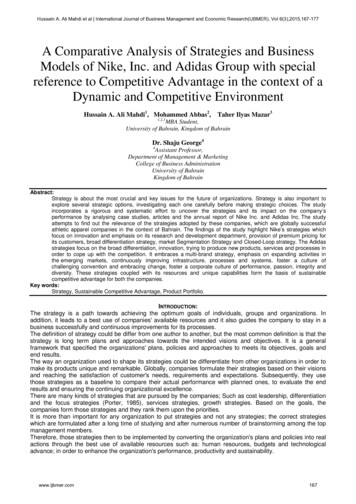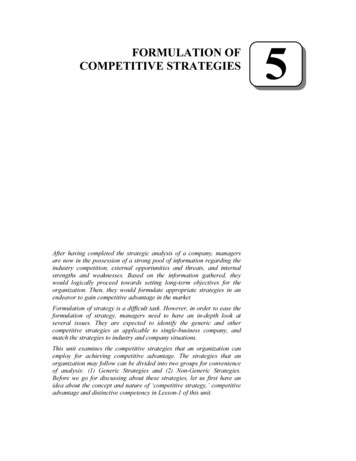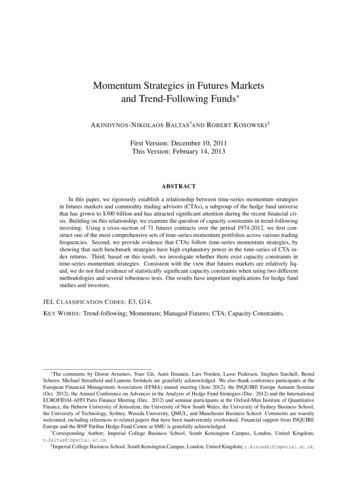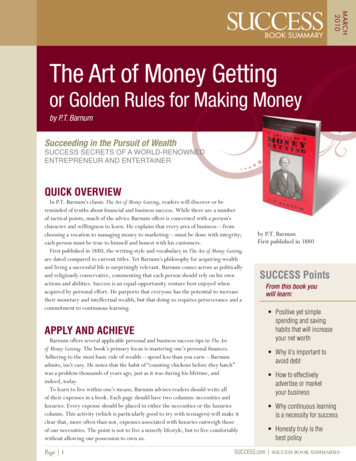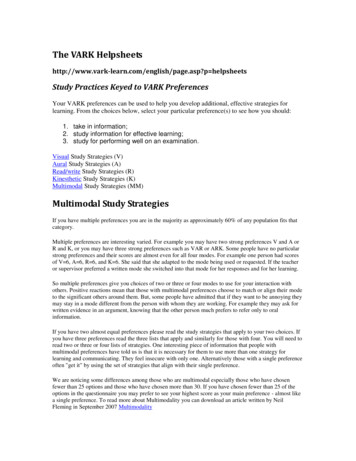
Transcription
25Success Strategiesto Supercharge YourCommunicationSkills
www.ShirleyTaylorVT.com2
IntroductionIf you want to improve your communication skills, you’re in the right place. Inthis ebook, I’ve put together 25 super successful strategies that will help youto become a better communicator.Many people today actually start their working lives not knowing how tocommunicate effectively face-to-face with colleagues, let alone with clientsand employers. They seem more comfortable looking at their smartphonesrather than at other human beings. They often have no idea how to mastersmall talk when meeting new people.Luckily, successful communication skills can be learned, and help is right herein your hands. You’ll find every strategy in this book very useful and practical from improving your confidence to enhancing teamwork, from activating yourlistening skills to developing great relationships.Excellent communication skills will help you build great relationships, andthat, to me, is one of the most important building blocks of success today. Icannot overstress the power of great relationships and connections.I know you will find the strategies in this book useful. I’m convinced that whenyou start putting them into practice, they will launch you along the road to amore successful, more fulfilling future.Enjoy!Shirley TaylorVisit my personal website: www.shirleytaylor.comVisit my corporate website: www.sttstraining.comCheck out my interactive virtual training program ‘Business Writing that T.com3
www.ShirleyTaylorVT.com4
About the AuthorShirley Taylor CSP (Certified Speaking Professional)* has established herself as a leadingauthority in modern business writing and communication skills. She is the author of 12successful books on communication skills, including the international bestseller, ModelBusiness Letters, Emails and Other Business Documents seventh edition, which has soldover half a million copies worldwide and has been translated into several languages.Widely-regarded as an expert in business writing and success skills, Shirley is a high-energy,high-content public speaker and trainer who educates, inspires, informs and motivatesindividuals to develop better relationships both orally and in writing. She puts a lot ofpassion and energy into her workshops and presentations to make sure they are entertaining,practical and informative, as well as a lot of fun.With her friendly, down-to-earth style, she has a unique way of engaging with the audience,and is passionate about helping people commit to change. Audience members quickly seeand share her passion and enthusiasm, and are motivated to use her strategies back at theworkplace.Originally from the UK, Shirley has lived and worked in Singapore, Bahrain and Canada.Based in Singapore now, Shirley is CEO of STTS Training Pte Ltd, a company highly-respectedfor its range of high-quality public and in-house communication training.Shirley is proud to have been 2011-12 President of Asia Professional Speakers Singapore, amember of the Global Speakers Federation, and was awarded their Spirit of Service Awardthree years in a row. She now serves on the Executive Committee of the Global SpeakersFederation.* Shirley Taylor is one of fewer than 700 Certified Speaking Professionals (CSP) in the world. CSP is thespeaking profession’s international measure of professional platform skill. The designation is globallyrecognised and awarded to speakers who have met strict criteria. This designation is achieved by fewerthan 11% of professional speakers worldwide.www.ShirleyTaylorVT.com5
1FROM ORDINARY TO EXTRAORDINARYSome people wake up feeling tired and they go through the motions at work with a frownon their faces, they just keep their head down, do the job and then go home. Is that a goodway to exist?I remember when friends used to visit my mum in the hospital, they were always amazedat her cheerfulness and her smile, even though she was very ill. My mum told me, “Peoplewouldn’t come to see me if I was miserable!”What about you? We all wake up every day with a clean slate. You can make the day anythingyou want it to be. Anything you choose it to be.Before I became a speaker, trainer and author, I was a secretary for nine years. What a greatlearning period that was. What I look back, I can see that even then I somehow knew aboutthe importance of building relationships. For example:[[[[[[When my boss wanted a cheque urgently, I just had to call up the lady in Accounts andI got the cheque within minutes.When my boss wanted a cup of tea for guests and I was really busy, I just had to ask thetea lady and the boss got his tea, and a friendly smile, within minutes.When my boss wanted me to go out and buy him a birthday present to give to his wife.I was happy to do it – as long as he gave me the keys to his Mercedes! And he got hispresent within. a couple of hours!In any job or business, relationship building has to be the most important objective. Thequality of the relationship will determine the quality of the service.For so many people today their interactions are purely transactional – they focus on theresult, just getting the job done, often at the cost of relationships. More successful peoplechoose relational interactions – they focus on how people are treated in the course ofachieving results.[[Start focusing on RELATIONSHIPS, and you will really start making a positive difference.[[Start focusing on RELATIONSHIPS, and your job will become much more enjoyable.[[[[[[Start focusing on RELATIONSHIPS, and your colleagues and clients will become yourfriends.Start focusing on RELATIONSHIPS, and your work will become less of a toil and more ofa pleasure.Start focusing on RELATIONSHIPS, and you’ll start making a positive difference in thelives of everyone around you, and in your own life!Remember!It takes less than a second to raise your standards, to put some passion into your job andyour life, and to commit to turning the ordinary into extraordinary.www.ShirleyTaylorVT.com6
2INCREASE YOUR VOCAL CLARITYIf you work in a multi-cultural environment, you’ve probably had experiences where you’vewondered, “Did he say ‘thought’ or ‘taught’? Was that word, ‘pirate’ or ‘pilot’? Did she reallysay ‘sheet’ or was it something else?”The way you pronounce your words and the tone of voice you use will have an impact on theeffectiveness of any message. Just as using the right words is essential, it’s also important toconsider your voice and your tone if you are to be understood and get your message acrosseffectively.Here are four simple steps to help you increase your vocal clarity:1.Slow downSo many people speak too quickly and almost in a monotone. Please slow down. It willgive you more confidence, not less.2. Keep your language simpleDon’t use big words, thinking you’ll impress people. You won’t. Simple is better.3. Check for understandingAsk your listeners if they have understood your pronunciation, since they may hesitateto tell you.4. Take time to e-nun-ci-ateReally articulate every word. It may feel rather unnatural to you at first, but stick with it.Your comfort level will rise, and your clarity will improve. This also means your listener’scomfort level will increase.Remember!If you follow these great steps, you will not only make your conversations more productive.You’ll enhance your reputation too.www.ShirleyTaylorVT.com7
3LISTEN, REPEAT AND REFLECTThanks to email, instant messages, chat rooms, social media and other tools brought tolife courtesy of technology, we all have a whole lot more to learn these days if we are tocommunicate effectively with others.It used to be that people only needed to sharpen their communication skills for phoneconversations and face-to-face appearances. For many, these scenarios were bad enough.Nowadays, even in small groups and one-to-one settings, effective communication is gettingtougher. Fortunately, there are some very simple tips that anyone can use to help them onthe road to clear, effective communication.Whether addressing a large crowd, talking on the phone, or working one-on-one, masteringthese three essential skills will put you well on your way to becoming a much bettercommunicator:1.ListenCommunication is a two-way street. Half the battle is learning how to really hear, processand respond to what others are saying. A good listener takes a keen interest in hisaudience, uses appropriate verbal and non-verbal door-openers, and asks questions toencourage conversation.2. RepeatWhen you paraphrase something in a different way to how it was delivered to you, you’reclarifying your understanding and stimulating further discussion.3. ReflectToo many people open their mouths and speak without thinking. Before you let thewords escape, think carefully. Slow down to make sure you have given appropriateconsideration to what you are about to say.Remember!“I remind myself every morning: Nothing I saw this day will teach me anything. If I’m going tolearn, I must do it by listening.”Larry Kingwww.ShirleyTaylorVT.com8
4WORK WELL IN YOUR TEAMAs the saying goes. “There is no ‘I’ in team.” There are, however, a number of people whomust come together to create a cohesive unit working towards a common goal. If this isn’tthe case, a team will likely find itself facing failure.When you are in a team situation, your contributions, actions and reactions will matter.The better you handle yourself, the stronger your team will become. Whether you’re amanager leading a team or one of its members, creating a successful team is as much yourresponsibility as it is everyone else’s.Here are some tips that can help you become a productive, vital part of a team:1. Play to your strengthsYour strengths, skills and abilities are the commodities you bring to your team. Identifythem and share what you do best. Ideally, your team will include a number of people withdifferent strengths. It will then become much easier to compensate for any weaknesses.2. Be honest about your weaknessesIdentifying and understanding your weaknesses will help you become a stronger, morevaluable team member. Other team members will ideally be poised to help on issuesthat are not best suited to your abilities. By understanding your weaknesses, you canlearn to accept this help without feeling threatened. Essentially, it can make you a betterteam player.3. Communicate clearlyCommunication is critical for any successful team. If a team is going to work well together,it’s essential to have clear, concise lines of communication. To do your part, take stepsto master some of the keys to successful communication.4. Don’t be afraid to delegate or share workIt’s often the case in teams that one or two key members carry the load. But in highlyfunctional teams, every member effectively shares work and contributes to overallsuccess. Tasks must be delegated appropriately based on strengths and weaknesses.5. Do not try to grab the limelightJust like in sports, it takes every member performing well to bring home a win. Keep thisin mind and try to focus on the task at hand and the role you play in making it happen.The limelight will shine on the entire team – you included – if you handle your tasksefficiently.While the saying goes, there is no ‘I’ in team, this is not entirely true. When every individuallearns how to work for the good of the team, everyone wins. The process starts with you.www.ShirleyTaylorVT.com9
5CHOOSE YOUR WORDS WITH CAREAlways and never are two words that you should always try never to use! Hmm! It’s true,though. Imagine you say to a colleague, “You never get to work on time.” She might reply with,“Two Wednesdays ago, I was 5 minutes early!”You could really undermine your relationships and generate negative reaction. It’s reallyimportant to be sensitive to how different words will be received by our listeners.AlwaysA word like ‘always’ can easily be perceived as an attack on the listener. When you are tryingto improve a situation, it’s much better to choose a softer approach, looking for a win-winsolution.NeverSaying to someone, “You are always late for work!” will not be as effective as telling youremployee, “I’ve noticed you’ve not been getting to work on time a lot lately. Are you havingany difficulties we can discuss?” They won’t feel attacked, and you can take the conversationfrom there.ShouldThis is another dangerous word. For example, “You should have brought an umbrella!” That’sa bit ridiculous when you’re soaking wet already. Even when people ask for advice on whatthey should do, it’s more motivating to use empowering language like, “You might want totry ” or, “Perhaps you can ” rather than “you should.”ButThe word but can be seen as a negative. It can erase everything positive that came before it,and the listener will focus on the negative.CompareThis model is very popular, but it is only does 35 miles per gallon.This model is very popular, and it does 35 miles per gallon.You can immediately see how positive the second sentence sounds, and how there is nochange in the information, only in the attitude.Sometimes it will be essential to use ‘but’; just be aware of its negative implications andconsider if an alternative would be more appropriate.www.ShirleyTaylorVT.com10
MaybeAlways think carefully before using weak words like ‘try’, ‘maybe’, ‘perhaps’. They don’t giveany sense of commitment, only uncertainty. “I’ll try to get this finished today,” gives you anexcuse if you somehow can’t work on it. (“Well, I tried, but it didn’t work!”) “Maybe I’ll dropover to your place is evening.” This will leave me wondering whether you will or not.You mustPhrases like “You have to ”, You must ”, “You’d better ” are very demanding. They makepeople feel like they have no choice.Can’tNegative words like ‘no’, ‘can’t’, and ‘don’t’ shut down discussions and stir up negativefeelings. It’s best to avoid them where possible.www.ShirleyTaylorVT.com11
6DON’T ASSUME!Have you ever made an assumption? Perhaps you didn’t give someone a chance to finishwhat they wanted to say? Maybe you didn’t listen carefully in the first place? Perhaps thespeaker paused, so you jumped in too quickly and completed his sentence?Another reason we make an assumptions is that we think we know what the other person isgoing to say. Well, I don’t know if you have psychic powers and can read minds, but I know Isure can’t. That’s why language developed – so we can communicate clearly. Guessing whatanother person will say just causes confusion.Making assumptions not only causes confusion, but it also causes delays that most of uscannot afford. Time is money, and taking the time to explain where someone has made awrong assumption is a waste of time could be used for more productive work.Similarly, making assumptions can also cause ill feelings in the office. If you are constantlyfinishing other people’s sentences and jumping to conclusions about their ideas, theoffice dynamic is strongly affected. Others will stop including you in their meetings andbrainstorming sessions because they know you don’t pay attention anyway.The key to keep from assumptions in communication is to give full attention to the otherperson and understand exactly what he or she is saying first before adding your commentsto the discussion.Here are some more tips to ensure you won’t be the one wasting time by making incorrectand often embarrassing assumptions when you communicate with others:1.Be patientYour ideas are important, but no more important than anyone else’s.2.Listen carefullyIf you are busy thinking about what you want to say, you aren’t going to hear what theother person is saying.3.Take notes if necessaryIf the discussion is a long one, notes can help you remember the points you want tomake.4.Rephrase what was said in your own wordsThis is the clearest way to esure you haven’t made an assumption about what astatement means.5.Don’t interruptThe speaker may be going on to clarify exactly what you are questioning.6.Pause and reflectAllow some time to let the speaker’s comments fully sink in by pausing and reflectingbefore you jump in to speak.www.ShirleyTaylorVT.com12
7PLAY NICE WITH YOUR CELL PHONECell phones are everywhere today, but standards of behaviour for their use have laggedbehind a bit. If you want to stay on good footing with everyone you meet, remember thatgood cell phone etiquette boils down to one basic rule: use good judgement!Today’s cell phones allow us to do so much more than the word ‘phone’ implies – talk,text, search the Internet, watch movies, listen to music, review and respond to emails, playgames and more. Each of these activities requires good judgement as to whether a certaintime and place is appropriate for a particular activity or not.Here are some questions to ask yourself when considering using your cell phone:1.What are you doing?2. What are the people around you doing?3. Will you be interacting with the people around you in any way?4. Will your activity disturb the people around you in any way?5. What is the importance of the call compared to the first four issues?One example where people tend not to use good judgement is when driving. You mightnot want to turn the phone off while driving, but certainly if you receive a call that needsto be handled right then, it would be good judgement to pull over to the side of the roadto complete the conversation. Hands-free use is a great, but it’s not your hands that aretrying to concentrate on busy traffic and the big merger all at the same time. In this drivingsituation, the answers to the questions in the earlier point suggest that your safety and thesafety of the people in other cars are more important than a phone call; it’s certainly moreimportant than a text or a game.And what about the business lunch where you are expecting an important call regardinga huge sale? You have several options here. You could turn your phone off, but that’s notparticularly polite to the person who might be using their lunchtime to get this importantinformation to you. You could answer the call and discuss the entire deal for the rest of thehour, but that’s not going to be polite to your lunch companions.Good manners would mean letting the others know at the start of lunch that you areexpecting a very important call. Apologise to them beforehand and let them know that ifyou do get the call during lunch, you will keep it short. Thank them for their understanding.Put your phone on vibrate, and if the call does come through, excuse yourself and step awayto keep disruptions to a minimum.www.ShirleyTaylorVT.com13
8ACHIEVE SUCCESS THROUGH POSITIVE RELATIONSHIPSThe world is filled with people, not products and consumers. These are real people desirea connection with other people - people they want to work with can trust for the long term.The most successful people achieve their success largely because they treat those aroundthem in a way that establishes and maintains positive business relationships.Here are some reasons why you need to focus on establishing positive relationships for agrowing business and increasing success:Branding and reputationBeing kind, courteous and attentive to clients will instantly infuse your brand with personality.You can improve your brand every day by maintaining positive relationships.Long-term profitability and regular clientsIt takes loyal, repeat customers, to really fuel the fires of commercial success. Building greatrelationships can ensure your clients are with you for the long term.Brand resiliencePeople are averse to risk by nature, and will cut back business when time are tough. Increaseyour stability during the low times by maintaining a strong network of relationships.Customer satisfactionIt’s impossible to get everything right all the time, but it is important to fix problems whenthey arise. Clients can easily move past issues if they are treated with respect and listenedto.Word-of-mouth advertisementPeople will readily recommend your products and services if you establish a positiverelationship with them. Hone your communication and business etiquette so you make asparking impression.Improved working environmentA grumpy boss can immediately throw the whole work atmosphere into a gloom. Healthyrelationships between co-workers are vital for an energetic workplace. When you treat yourcolleagues with respect and warmth, you will increase productivity and satisfaction.FriendshipsBusiness relationships can turn into friendships. It isn’t fun to be alone all the time doingyour work. Establish positive relationships with your co-workers and they could become lifelong friends.www.ShirleyTaylorVT.com14
Personal well-beingHaving positive relationships with those around you can infuse your day with joy andfulfillment. To develop happiness at the workplace, you need to be open, affirming, and feelgood about the people you work with.Networking and social mediaStrong business relationships require nurturing. The more you positively interact with aperson, the closer you will become over time. This influence can spread into an entirenetwork of interconnected influence, where each person maintains a thread of connectionbetween increasing numbers of others. In this noisy world, simply shouting into the crowdwon’t get you noticed. Maintain your network and you have a voice.Remember!“Trust is the glue of life. It’s the most essential ingredient in effective communication. It’s thefundamental principle that holds all relationships together.”Stephen Coveywww.ShirleyTaylorVT.com15
9LEARN TO BE LIKEABLEYour success at work will partly depend on how much people are willing to interact with you.Let’s face it, you can’t get your work done if people avoid you!When people meet you for the first time, they usually form an almost immediate opinionabout you. Sometimes it will be the right opinion, sometimes it will not. If you want to besuccessful personally and professionally, it will be a lot easier if people like you.Here are the three Cs of developing likeability:Credibility:Your credibility is the extent to which others believe what you tell them.Do you do what you say you will do? Do you keep others informed? Areyou trustworthy? If you want to gain respect, create trust, and build a greatrapport with people, you must work on your credibility.Consistency:People will trust you if you act in a consistent manner, and if you treatpeople similarly, you can only expect consistent results from people youcommunicate with if you are also consistent.Confidence:If you think and act more confidently ad positively, you will be able tocommunicate more confidently and effectively. You’ll also get people toco-operate with you more easily. Confident people make wonderful teamplayers.If you find a spark is missing in your relationships, consider working on these three Cs.Improve your likeability by working on your credibility, your consistency, and your confidence.Remember!“I’ve trained myself to illuminate the things in my personality that are likeable and to hideand protect the things that are less likeable.”Will Smithwww.ShirleyTaylorVT.com16
10SUPPORT YOUR MESSAGE WITH YOUR BODYDo you twist your hair or play with your rings? This could imply that you’re nervous or notfocused. Do you point a finger at the other person’s chest? This implies aggression. Do youslouch? This implies a lack of confidence. Do you hop from foot to foot when talking to yourmanager? This shows a lack of confidence too.Even if you’ve structured your message well, you could blow it completely if your posture,gesture and facial expressions don’t support your message.In communication, your body language can be one of your best assets, as long as use itwell. To start with, be aware of what your body is doing and saying. By making some minoradjustments in your posture, your gestures and your facial expressions, you will help yourselfbecome a much better communicator. Your face and your body language can be two of yourgreatest tools in your communication toolbox. Use them well to help you come across as aconfident, relaxed communicator.Here are some behaviours you may want to fix.SlouchingSome big, comfortable chairs are very easy to slouch in, but when you do this, you may looktoo relaxed and informal. People may not take you seriously. If you want to come across asan assertive, confident communicator, it’s best to sit up, and stand up, straight.Distracting habitsPlease avoid annoying distractions like twisting your hair, playing with rings, or clicking yourpen they will make the listener pay attention to your habits, and form judgements aboutthem, rather than focus on your message.Blank looksA blank look is one that shows no expression or emotion. The only time blank looks will helpyou is when you are playing poker! When trying to convey an important message, blank lookswill make you appear indifferent. Use your face to show expression both when receiving andgiving messages.Work faceWhen you’re at your desk concentrating on your work, your brow may be furrowed and yourlips pursed. If your assistant walks in at this point, and you look up still wearing this ‘workface’, he might think your face is saying, “What the heck do you want? How dare you interruptme!” If you think you might be guilty of wearing your work face, just take a moment to relaxand adopt an open expression when people knock on the door. This way, people will feelmore comfortable coming in to talk to you.www.ShirleyTaylorVT.com17
11TOUCH UP YOUR TELEPHONE HABITSHave you ever been put on hold and then couldn’t remember who you called? Have youdialled someone and then had to stop and think about the reasons you made the call? Haveyou ever had a conversation with someone who was tapping away at the computer at thesame time?We are often so busy and wrapped up in our own work that we sometimes forget thatreal human being is on the other end of a telephone call. Let’s not forget how to use thetelephone with courtesy!Here are some common complaints about phone conversations and ways to correct them:Do you interrupt or talk over another person without meaning to?Some cell phones are designed to blank out the quieter side of a conversation, so it’s easyto talk over someone else. To avoid this, be sure to await a second or so after you thinksomeone has finished speaking before starting your own statement.Do people ask you to repeat what you have said?You are probably mumbling or speaking too quickly, so slow down and enunciate. You knowthat what you are going to say, but the person on the other end doesn’t, and is relying onyou to speak clearly enough to understand you.Do you speak the other person’s language with your own accent?If you speak at your normal speed, your listener may struggle to understand you. Slow downand use good intonation. Non-native speakers of your language will appreciate you takingthe time to pronounce the words carefully.Do you ever answer the phone while chewing gum or eating?This can be most annoying, so please don’t do it. If you are eating lunch at your desk whenthe phone rings, either wait until you have completely cleared your mouth or let your voicemailer answer.Have you ever multitasked while on the phone?Yes, you are a business superman or superwoman! You can type an email and talk on thephone all at the same time! The problem with that is the person on the other end will hearpauses in your responses, computer sounds, and your keyboard clacking away. So stop whatyou are doing and give the caller your full attention. If you need to look something up onyour computer during a call, let them know. Then the clackety-clack of your keyboard will bea welcome noise instead of a sign of disrespect.www.ShirleyTaylorVT.com18
12TELEPHONE MANNERSWe all use the telephone, perhaps several times a day. But does this mean you’re good atit? These days, a lot of us are using the phone much less than before, but sometimes there’snothing better than a spoken conversation to resolve a problem and establish a bond.A great way to consider what works well on the telephone is to look at all the things thatabsolutely don’t work. Here’s a list of some of the many ways you can annoy the person onthe other end of the line:[[Sound abrupt, especially when you pick up the call.[[Speak in a really formal, stilted manner.[[Don’t include any pauses.[[Speak while eating or chewing the end of your pen.[[Tap way on your computer while speaking or listening.Remember!If you want to gain a reputation as a thoughtful communicator – and if you want people toanswer the phone when they can see it’s you calling – then be sure to behave considerately:This means:[[Give them your full attention. Make a commitment to the caller.[[Speak in a friendly, informal tone, to help build the relationship.[[[[Remember that people need time to think on the telephone too, so don’t feel obligedto fill every gap.Don’t talk and type!www.ShirleyTaylorVT.com19
13USE EMPATHYThe need to be understood is one of the highest human needs, but many people just don’tmake an effort to find out how others really feel. To show empathy is to identify with anotherperson’s feelings. It is to emotionally put yourself in the place of another. Empathy is verydifferent to sympathy.Sympathy is a feeling of care and understanding for suffering beings.Empathy is the ability to mutually experience the thoughts, emotions and direct experienceof others without them being communicated intentionally.Many people have difficulty with empathy and with expressing with real feelings. This issuch a shame. Get in touch with your feelings today, and use empathy. It really helps. Justimagine the difference you can make if you truly get to know people and understand howthey feel. It could really set you part from the rest, and you’d start giving great value thatmany other don’t give.Remember!Most experts in communication, management and self-developme
authority in modern business writing and communication skills. She is the author of 12 successful books on communication skills, including the international bestseller, Model Business Letters, Emails and Other Business Documents seventh edition, which has sold over half a million copies
